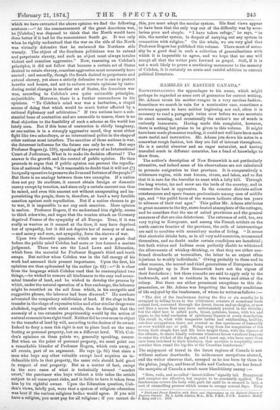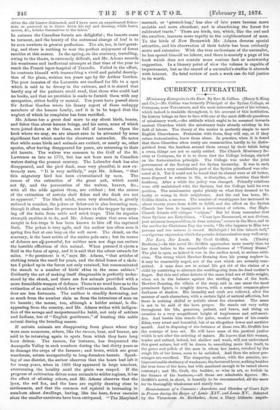RAMBLES IN EASTERN CANADA.* NOTWITHSTANDING the appendages to his name,
which might perhaps be regarded as some sort of guarantee for correct writing,
Mr. Adams treats his mother-tongue in a very careless fashion. Sometimes we search in vain for a nominative case, sometimes a sentence appears to have neither beginning nor end, often it is necessary to read a paragraph twice over before we can ascertain its exact meaning, and occasionally the author's use of words is curiously inaccurate. Having made this complaint, however, there is nothing but praise to be given to this volume. It might have been made pleasanter reading, it could not well have been made more useful and instructive. Mr. Adams jots down his notes in a somewhat rough fashion, but they are full of interest throughout. He is a careful observer and an eager naturalist, and having travelled much in different countries, has a fund of knowledge to draw from.
The author's description of New Brunswick is not particularly attractive, and indeed some of bis observations are not calculated to promote emigration to that province. It is comparatively a wilderness region, with vast forests, rivers, and lakes, and so fiat that it is rare for the traveller to meet with a lofty hill. Through the long winter, ice and snow are the lords of the country, and in summer the heat is oppressive. In the remoter districts sallow countenances and spare frames predominate among men of middle age, and "the pallid faces of the women indicate often ten years in advance of their real ages." This pallor Mr. Adams attributes in great measure to the dry, stove-heated atmosphere of the cottages, and he considers that the use of salted provisions and the general sameness of diet are also deleterious. The extremes of cold, too, are very trying to Europeans, and among the French settlers on the north-eastern frontier of the province, the evils of intermarriage are said to combine with unsanitary modes of living. "It seems that alcoholic drinks here, as in all very cold countries, recommend themselves, and no doubt under certain conditions are beneficial ; but both whites and Indians seem perfectly nimble to withstand the allurements of whiskey-drinking, so that they are either con- firmed drunkards or teetotallers, the latter to an extent often injurious to weakly individuals." Owing probably to these and to other reasons, the second and third generations of Europeans born and brought up in New Brunswick have not the vigour of their forefathers ; but these remarks are said to apply only to the backwoods, and not to residents in the towns and cities of the colony. But there are either prominent exceptions to this de- generation, or Mr. Adams was forgetting the healthy conditions of life enjoyed by the lumbermen, of whom he writes as follows :— " The diet of the lumberman during the five or six months he is occupied in felling trees in the wilderness consists of occasional fresh animal food, conveyed through the forest, frozen and on sleighs, or now and then a moose that may have unfortunately yarded in the vicinity; but the chief fare is salted pork, bread, potatoes, beans, with tea and sugar, to the total exclusion of spirituous liquors of every description. The result is, what with temperate habits and exhilarating, healthy, out-door occupations, there are created as fine specimens of humanity as ever wielded axe or poll. Boing away from the temptations of the towns, their simple fare and life have taught them, with the rigours of the climate, to make kindly welcome whatever forest wanderer happens to enter the wicket of the log-hut, and I must say, who have more than once been indebted to their kindness, that nowhere is hospitality more genuine than round the log-fire of the Canadian lumberman."
The enjoyment of travel in the forest regions of Canada is not without serious drawbacks. In midsummer mosquitoes abound, and the writer observes that, annoyed as he has been by them in the plains, jungles, and fens.of India and Cashmere, he has found the mosquito of Canada a much more bloodthirsty enemy :- "Nets, veils, and so-called insect-killers' signally fail. Pennyroyal and camphor are effective, but require to be constantly applied. The lumberman covers his body with pork fat until he is encased in lard, a sort of enamelling process which seems to occupy several days. They • Field and Forest Rambles, toith Notes and Observations on the Natural History of Eastern Canada. By A. Leith Adams, MA., ILB., F.G.S. London: Henry S. King and Co. IR&
drive the old hunter distracted, and I have seen an experienced fisher- man so pestered as to throw down his rod and decamp, while bears, moose, itc., betake themselves to the lakes."
In autumn the Canadian forests are delightful ; the insects cease to torment, and the beauty of the autumnal change of leaf is to be seen nowhere in greater perfection. The air, too, is invi gorat- ing, and there is nothing to mar the perfect enjoyment of forest rambles at this season. In the spring, on the contrary, travelling, owing to the thaws, is extremely difficult, and Mr. Adams records his wearisome and ineffectual attempts at that time of the year to reach the French leper-hospital of Tracadie. Foiled in the effort, he contents himself with transcribing a vivid and painful descrip- tion of the place, written ten years ago by Sir Arthur Gordon. The poor inmates of the Lazaretto are confined for life to a spot which is said to be dreary in the extreme, and it is stated that hardly any of the patients could read, that those who could bad no books, and that no provision is made to furnish them with any occupation, either bodily or mental. Ten years have passed since Sir Arthur Gordon wrote his dreary report of these unhappy members of the human family, and it is to be hoped that the neglect of which he complains has been rectified.
Mr. Adams has a great deal more to say about birds, beasts, and fishes than about human beings, and his notes, some of which were jotted down at the time, are full of interest. Open the book where we may, we are almost sure to be attracted by some significant fact which marks the observant naturalist. He notes that while some birds and animals are extinct, or nearly so, other species, after having disappeared for years, are returning to their old haunts. The walrus was common in the Gulf of the St. Lawrence as late as 1770, but has not been seen in Canadian waters during the present century. The Labrador duck has also disappeared, and the pied duck, once very plentiful, is now ex- tremely rare. " It is very unlikely," says Mr. Adams, " that this migratory bird has been exterminated by man. The causes of the extinction of the great auk, which could not fly, and the persecution of the walrus, beaver, &c., with all the odds against them, are evident ; but the causes of the extinction of certain shell fishes and the duck are not so apparent." The black mink, once very abundant, is greatly reduced in number, the pekan or fisher-cat is also becoming rare, though it often makes its presence known to the trapper by carry- ing off the baits from sable and mink traps. This its superior strength enables it to do, and Mr. Adams states that even when caught in fox-traps it has been known to bite off the captured limb. The pekan is very agile, and the author has often seen it spring five feet at one leap on the soft snow. The skunk, on the contrary, is the least active of the native pole-cats ; but its means of defence are all-powerful, for neither men nor dogs can endure the horrible effluvium of this animal. When pursued it ejects a fluid in the form of spray, and it is said that the odour extends for miles. So persistent is it," says Mr. Adams, " that articles of clothing retain the smell for years, and the dried bones of a skele- ton I picked up in the forest not only retained, but communicated the stench to a number of birds' skins in the same cabinet." Evidently the art of making itself disagreeable is perfectly under- stood by the skunk, and there are few animals provided with a more formidable weapon of defence. There is no word here as to the extinction of an animal which few will venture to attack. Canadian deer are less fortunate. The cariboo is steadily decreasing, not so much from the number slain as from the intrusions of man on its haunts ; the moose, too, although a bolder animal, is dis- appearing from the country, and Mr. Adams writes with indigna- tion of the savage and unsportsmanlike habit, not only of settlers and Indians, but of "English gentlemen," of hunting this noble animal during the breeding season.
If certain animals are disappearing from places where they were once numerous, others, like the racoon, bear, and beaver, are said to be returning again to spots from which they have long been driven. The racoon, for instance, has frequented the Annapolis Valley in such numbers during the last thirty years as to damage the crops of the farmers ; and bears, which are great wanderers, return unexpectedly to long-forsaken haunts. Speak- ing of one district, the author observes that the bears had left it
for many years, when in 1865 they appeared in large numbers, overrunning the locality until the grain was reaped. If the
progress of cultivation drives some animals to wilder regions, it has the effect of alluring others, and Mr. Adams observes that the lynx, the red fox, and the hare are rapidly drawing close to settlements, and that the common red squirrel is increasing in numbers about dwellings, having, like the hare, fewer enemies since the smaller carnivora have been extirpated. " The Maryland marmot, or ' ground-bog,' has also of late years become more sociable and more abundant, and is abandoning the forest for cultivated tracts." There are birds, too, which, like the owl and the swallow, increase more rapidly in the neighbourhood of man. To the birds of New Brunswick Mr. Adams devotee special attention, and his observation of their habits has been evidently acute and extensive. With the true enthusiasm of the naturalist, he has spared himself no labour, and there is scarcely a page of his book which does not contain some curious fact or noteworthy suggestion. In a literary point of view the volume is capable of improvement, but as the record of a naturalist's studies it abounds with interest. No brief review of such a work can do full justice to its worth.



































 Previous page
Previous page